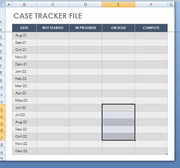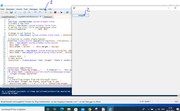Code:
'Version : 5.1.19041.1320
'InstanceId : e165cf30-9ddd-49ed-96c7-59cca98516ee
'UI: System.Management.Automation.Internal.Host.InternalHostUserInterface
'CurrentCulture: DE -DE
'CurrentUICulture: DE -DE
'PrivateData: Microsoft.PowerShell.Host.ISE.ISEOptions
'DebuggerEnabled : True
'IsRunspacePushed : False
'Runspace: System.Management.Automation.Runspaces.LocalRunspace
'https://excelfox.com/forum/showthread.php/2408-Windows-10-and-Office-Excel/page51#post12776
'https://excelfox.com/forum/showthread.php/2559-Notes-tests-text-files-manipulation-of-text-files-in-Excel-and-with-Excel-VBA?p=15356#post15356
'https://eileenslounge.com/viewtopic.php?f=18&t=37740
'https://eileenslounge.com/viewtopic.php?f=18&t=37712
'https://eileenslounge.com/viewtopic.php?f=18&t=37707
Sub Services() ' https://excelfox.com/forum/showthread.php/2408-Windows-10-and-Office-Excel/page51#post12776 https://excelfox.com/forum/showthread.php/2559-Notes-tests-text-files-manipulation-of-text-files-in-Excel-and-with-Excel-VBA?p=15356#post15356
' PowerShell
Dim PScmdLet As String, cmdLet As String
'Let cmdLet = "Get-Service|Select-Object name,displayname,starttype|Format-Table -AutoSize|Out-File -FilePath 'C:\Users\acer\Desktop\test.txt' -Width 1000"
Let cmdLet = "Get-Service|Select-Object name,displayname,starttype|Format-Table -AutoSize|Out-File -FilePath '" & ThisWorkbook.Path & Application.PathSeparator & "test.txt' -Width 1000"
Let PScmdLet = "powershell -command " & cmdLet ' https://www.devhut.net/vba-run-powershell-command/
CreateObject("WScript.Shell").Exec (PScmdLet)
' Get the text file as a long single string
Dim FileNum As Long: Let FileNum = FreeFile(1) ' https://msdn.microsoft.com/en-us/vba/language-reference-vba/articles/freefile-function
Dim PathAndFileName As String, TotalFile As String
Let PathAndFileName = ThisWorkbook.Path & Application.PathSeparator & "test.txt" ' CHANGE TO SUIT From vixer zyxw1234 : http://www.eileenslounge.com/viewtopic.php?f=30&t=34629 DF.txt https://app.box.com/s/gw941dh9v8sqhvzin3lo9rfc67fjsbic
Open PathAndFileName For Binary As #FileNum 'Open Route to data. Binary is a fundamental type data input...
Let TotalFile = Space(LOF(FileNum)) '....and wot receives it has to be a string of exactly the right length
Get #FileNum, , TotalFile 'Debug.Print TotalFile
Let TotalFile = Replace(TotalFile, Chr(0), "", 1, -1, vbBinaryCompare) ' There seems to be a lot of Chr(0)s in the string https://i.postimg.cc/t43HCQr9/Rather-a-lot-of-Chr-0-s.jpg
'Let TotalFile = Replace(TotalFile, Chr(255) & Chr(254) & vbCr & vbLf, "", 1, 1, vbBinaryCompare) ' this would tsake the first bit of crap out, (alternatively we can just take out the first line when split later by
Close #FileNum
' Call WtchaGot_Unic_NotMuchIfYaChoppedItOff(TotalFile)
' make a 1 D array of the text file lines
Dim arrRws() As String: Let arrRws() = Split(TotalFile, vbCr & vbLf, -1, vbBinaryCompare)
' make array for output
Dim arrOut() As String: ReDim arrOut(1 To UBound(arrRws()) - 2, 1 To 3) ' we are ignoring the first 3 lines. The UBound of the 1 dimensional array is already 1 less then the lines we need because a 1 dimensional array starts at 0
Dim Cnt As Long
For Cnt = 1 To UBound(arrRws()) - 2
If arrRws(Cnt + 2) = "" Then
' This should occur at the last empty rows, so we could consider jumping out of the loop here
Else
' time to split the line string
Dim Pos1 As Long: Let Pos1 = InStr(1, arrRws(Cnt + 2), " ", vbBinaryCompare)
Dim Nme As String: Let Nme = Left(arrRws(Cnt + 2), Pos1 - 1)
Dim Pos3 As Long: Let Pos3 = Len(arrRws(Cnt + 2)) - InStrRev(arrRws(Cnt + 2), " ", -1, vbBinaryCompare)
Dim StrtTyp As String: Let StrtTyp = Right(arrRws(Cnt + 2), Pos3)
Dim DispNme As String: Let DispNme = Replace(arrRws(Cnt + 2), Nme, "", 1, -1, vbBinaryCompare)
Let DispNme = Replace(DispNme, StrtTyp, "", 1, -1, vbBinaryCompare)
Let DispNme = Trim(DispNme)
' fill the array for output
Let arrOut(Cnt, 1) = Nme: arrOut(Cnt, 2) = DispNme: arrOut(Cnt, 3) = StrtTyp
End If
Next Cnt
' Chuck array into a spreadsheet
Let ThisWorkbook.Worksheets("PowerShell").Range("A2").Resize(UBound(arrOut(), 1), 3).Value = arrOut()
ThisWorkbook.Worksheets("PowerShell").Cells.Columns("A:C").EntireColumn.AutoFit
End Sub







 Reply With Quote
Reply With Quote


Bookmarks